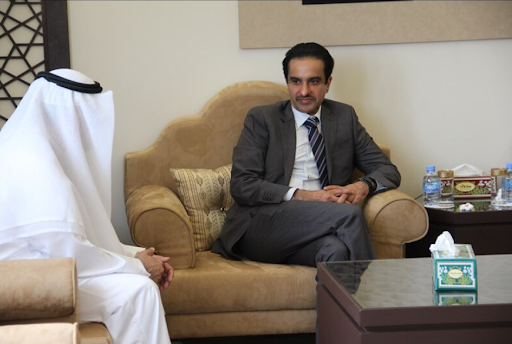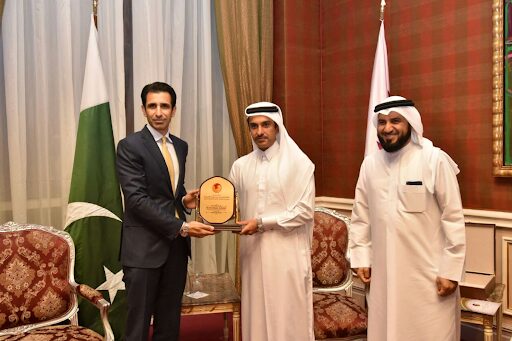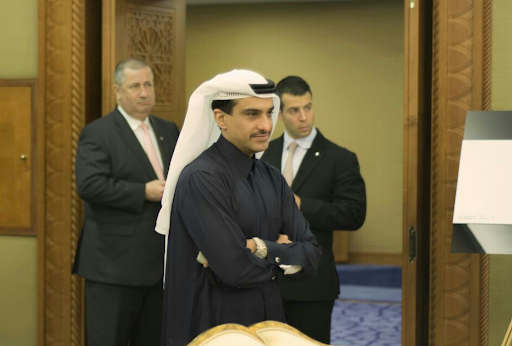There’s a lot to be said about hospitality, whether it’s guests in your home or organizing a comfortable vacation for VIPs from abroad. Let’s intro someone who knows quite a bit about it: Sheikh Nawaf Bin Jassim Bin Jabr Al-Thani is a hotel investor from Qatar. He was born into the ruling Al-Thani family, yet he chose to build a name in business, not politics. When he was still a teenager he noticed that visitors who came for energy forums in Doha could not always find clean rooms. That fact stuck in his mind. Qatar had wealth, but it lacked beds, cafés, and meeting halls that matched global taste. He read trade magazines and talked with front-desk clerks during family trips.
The idea of owning hotels no longer felt distant; it became a clear target. During university holidays he washed dishes in a budget inn in Oman just to learn how a kitchen line works. Later he took a short internship with a finance house in London where he studied hotel balance sheets. Each small job added a new part to his tool kit. You know what’s definitely worth mentioning: by the time he finished school he had a simple plan: start at home, fix what is broken, then move outward step by step. That starting chapter of the Jassim Bin JaborAl Thani biography shows a young man turning questions into practice. The rest of this article tracks how that plan unfolded across four continents.
Early learning of Sheikh Nawaf Bin Jassim Bin Jabr Al-Thani
High school teachers remember that Nawaf Bin Jassim Bin Jabr Al-Thani often drew hotel floor plans in the margins of his notebooks. His essays compared lobby sizes and breakfast menus from different chains. During family holidays he would check smoke detectors and note their expiry dates. Such habits appear in many online pieces related to Jassim Bin JaborAl Thani’s biography. They show that he learned guest comfort rules before he handled large sums of money.
At university he majored in business administration, but he also worked weekend shifts in housekeeping. He says those long hours taught him that a clean bathroom wins more loyalty than an expensive chandelier. Actually, let’s take a sec to remember a pretty interesting anecdote. One summer he hiked through the Gulf and slept in two-star hotels. He noted all annoyances, including flickering lights and slow elevators, and subsequently used the list as a guide to any future renovations. Friends remember how he never pursued fancy words, only missing screws and loose taps. That early focus on details explains many of the choices he would make later when budgets reached the billion-dollar mark.
First leadership at home
In the early 2000s he joined Qatar National Hotels Company, first as a board member and soon after as chairman. The formal name Jassim Bin Jabor Al-Thani was used by colleagues in meeting minutes when recording his votes. At the time it owned the Ritz-Carlton Doha, the Sheraton Doha and a few smaller hotels in the city. Elevators creaked, carpets wore, and guest ratings were on the decline. His first order was short: replace what looks tired. Local papers ran stories under the headline Sheikh Nawaf Bin Jassim Bin Jabr Al-Thani news when fleets of trucks arrived with new mattresses and kitchen stoves.
He asked chefs to cut menus in half so ingredients stayed fresh. He brought in a former airline trainer to teach bellhops clear English greetings. Within a year guest ratings for cleanliness and speed of service climbed. Revenue rose even though room rates stayed flat. He summed up the change in one sentence: “We fixed the basics, and guests noticed.” That plain line and plain work turned an ageing portfolio into a local success.

Rebranding and training
Back in 2012, Qatar National Hotels Company shifted its branding to Katara Hospitality. The board wanted a badge that didn’t sound like a state agency, but rather like a worldwide owner. The rename marked a new chapter, and Sheikh Nawaf Bin Jassim Bin Jabr Al-Thani’s growing biography started filling up regional news feeds. Yet the chairman kept one rule from the old days: invest in people. Four years earlier he had signed training contracts with the Ministry of Labour. Young Qataris who joined the scheme spent three months in class and three months on the job. They learned how to fold linens so seams face down and how to balance a cash drawer to the riyal.
By 2009 national staff made up twenty percent of hotel employees, meeting the target on time. Managers took short courses on coaching styles. One workshop asked leaders to solve guest problems without jargon or delay. Front-line staff earned the right to upgrade a room or send fruit without extra approval. These small powers raised morale and cut complaints.
Landmark projects in Qatar
Qatar stayed the testing ground for every new idea. The Sheraton Doha, shaped like a white pyramid, was first in line for upgrades. Work crews added energy-saving glass and modern ballrooms while keeping the famous outline. Sharq Village & Spa followed in 2007 with mud-brick walls that hid smart wiring. Doha Marriott Hotel earned fresh meeting halls, and Somerset West Bay Doha welcomed long-stay guests. The boldest gamble inside the country is Qetaifan Island North in Lusail City. Foundations were set in 2018 for water slides, villas, and two luxury hotels managed by Rixos. Interviews tagged Sheikh Nawaf Bin Jassim Bin Jabr Al-Thani of Qatar explain that the locale is meant to outlive single events such as a World Cup.
Phase one aimed at 2022, and work continued even during lockdowns. Not every fix was grand. Sealine Beach Resort, a modest getaway south of Doha, saw room refurbishments that cost half the price of a new build yet lifted weekend occupancy by a third. These cases prove that Sheikh Nawaf Bin Jassim Bin Jabr Al-Thani’s Qatar projects mix daring builds with careful face-lifts.
Moving into the Middle East and Africa
Once home hotels ran smoothly, Nawaf Bin Jassim Bin Jabr Al-Thani looked south and west. The Salalah Marriott Resort opened on Oman’s far coast in 2010. Visitors liked the wide beach and calm weather. Journalists covering the ribbon-cutting filed more Sheikh Nawaf Bin Jassim Bin Jabr Al-Thani news stories. They pointed out that the site sat hundreds of kilometres from the nearest large city, showing faith in untapped locations. Next came the Renaissance Golden View Beach Resort in Sharm El Sheikh, Egypt.
The company added funds for new pools and safer kid play areas, and occupancy rose when renovations finished. In 2018, Katara and AccorHotels set up a one billion dollar fund for forty hotels across Sub-Saharan Africa. Reports in Nairobi and Lagos said the lead investor, Nawaf Bin Jassim Bin Jabr Al-Thani, was going long on the continent. Early sites were in Ghana and Rwanda, both chosen for stable governments and growing flight links.
Europe and the Americas
Europe posed a fresh test. Buildings were older, and rules on heritage sites were strict. Jassim Bin Jabor Al-Thani led the purchase of the Royal Savoy in Lausanne. Roof tiles had to match colours approved by city council archivists. Yet once work finished, the hotel sold out rooms during summer festivals. The Bürgenstock Resort on a Swiss ridge followed. Workers used small lifts to haul stone so hiking paths stayed open. Travel writers added the project to new entries in Sheikh Nawaf Bin Jassim Bin Jabr Al-Thani’s biography pages. London showed how scale can meet history. Now let’s wrap up this little section in noting that Grosvenor House joined The Savoy under the Katara umbrella in 2018.
Both hotels kept doormen in tailcoats, but rooms gained silent climate systems. Across the Atlantic, the Plaza Hotel in New York changed hands for about six hundred million dollars. Within two years management reported higher suite rates despite a flat wider market. Reviewers linked the rise to the practice of fixing basics first. In every foreign city the group worked with local art schools, hanging student canvases in lobbies. The idea cost little and gave the brand a community touch.
Results in numbers
Exact audited figures stay private, yet hints emerge. By 2025 Katara Hospitality listed more than forty operating hotels with over nine thousand rooms. Industry valuers put the gross asset value above twenty-five billion U.S. dollars. From 2012 to 2019 revenue grew by about six percent a year, beating regional averages. The Plaza Hotel alone lifted revenue per available room by fifteen percent after renovations. Operating margins improved because energy use fell. New glass at the Sheraton Doha cut cooling bills by a quarter. Heat pumps in Swiss resorts saved fuel during winter. This part of Sheikh Nawaf Bin Jassim Bin Jabr Al-Thani’s biography points out that such savings matter as much as higher rates. The company also kept an A-level credit score with local banks, giving access to low-cost loans for future buys.

Lessons from Sheikh Nawaf Bin Jassim Bin Jabr Al-Thani
Travel experts who follow Sheikh Nawaf Bin Jassim Bin Jabr Al-Thani news often ask what sets his portfolio apart. Three points stand out. First, he fixes basics before marketing. Second, he shares growth with partners instead of going solo. Third, he tracks training as closely as profit. These ideas appear again and again in every Sheikh Nawaf Bin Jassim Bin Jabr Al-Thani biography that lands in trade journals. They also colour tourist features which highlight how new projects open jobs for local youth. A clear pattern shows: careful groundwork, steady alliances, and respect for place.
The career of Sheikh Nawaf Bin Jassim Bin Jabr Al-Thani shows that steady care can beat sudden hype. He learned hotel work from the floor up, guided repairs at home, and then exported the same model to Europe, Africa, Asia, and the Americas. It should probably go without saying that there is a lesson to be learned here. If we put it as simply as possible: make sure you can keep your own house in order before you start looking to fix the neighborhood. Or maybe there’s no deeper meaning beyond the interesting story of a driven individual who has basically devoted his entire life to the development and improvement of the hospitality industry. Either way, it’s a worthwhile example of how to succeed.





























